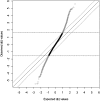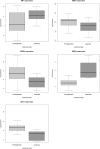A role for Wnt signaling genes in the pathogenesis of impaired lung function in asthma
- PMID: 19926868
- PMCID: PMC2822972
- DOI: 10.1164/rccm.200907-1009OC
A role for Wnt signaling genes in the pathogenesis of impaired lung function in asthma
Abstract
Rationale: Animal models demonstrate that aberrant gene expression in utero can result in abnormal pulmonary phenotypes.
Objectives: We sought to identify genes that are differentially expressed during in utero airway development and test the hypothesis that variants in these genes influence lung function in patients with asthma.
Methods: Stage 1 (Gene Expression): Differential gene expression analysis across the pseudoglandular (n = 27) and canalicular (n = 9) stages of human lung development was performed using regularized t tests with multiple comparison adjustments. Stage 2 (Genetic Association): Genetic association analyses of lung function (FEV(1), FVC, and FEV(1)/FVC) for variants in five differentially expressed genes were conducted in 403 parent-child trios from the Childhood Asthma Management Program (CAMP). Associations were replicated in 583 parent-child trios from the Genetics of Asthma in Costa Rica study.
Measurements and main results: Of the 1,776 differentially expressed genes between the pseudoglandular (gestational age: 7-16 wk) and the canalicular (gestational age: 17-26 wk) stages, we selected 5 genes in the Wnt pathway for association testing. Thirteen single nucleotide polymorphisms in three genes demonstrated association with lung function in CAMP (P < 0.05), and associations for two of these genes were replicated in the Costa Ricans: Wnt1-inducible signaling pathway protein 1 with FEV(1) (combined P = 0.0005) and FVC (combined P = 0.0004), and Wnt inhibitory factor 1 with FVC (combined P = 0.003) and FEV(1)/FVC (combined P = 0.003).
Conclusions: Wnt signaling genes are associated with impaired lung function in two childhood asthma cohorts. Furthermore, gene expression profiling of human fetal lung development can be used to identify genes implicated in the pathogenesis of lung function impairment in individuals with asthma.
Figures


Similar articles
-
The IL6R variation Asp(358)Ala is a potential modifier of lung function in subjects with asthma.J Allergy Clin Immunol. 2012 Aug;130(2):510-5.e1. doi: 10.1016/j.jaci.2012.03.018. Epub 2012 May 1. J Allergy Clin Immunol. 2012. PMID: 22554704 Free PMC article.
-
Genome-wide association study identifies TH1 pathway genes associated with lung function in asthmatic patients.J Allergy Clin Immunol. 2013 Aug;132(2):313-20.e15. doi: 10.1016/j.jaci.2013.01.051. Epub 2013 Mar 28. J Allergy Clin Immunol. 2013. PMID: 23541324 Free PMC article.
-
Whole Genome Sequencing Identifies CRISPLD2 as a Lung Function Gene in Children With Asthma.Chest. 2019 Dec;156(6):1068-1079. doi: 10.1016/j.chest.2019.08.2202. Epub 2019 Sep 23. Chest. 2019. PMID: 31557467 Free PMC article.
-
Association of VEGF polymorphisms with childhood asthma, lung function and airway responsiveness.Eur Respir J. 2009 Jun;33(6):1287-94. doi: 10.1183/09031936.00113008. Epub 2009 Feb 5. Eur Respir J. 2009. PMID: 19196819 Free PMC article. Clinical Trial.
-
Understanding genomics: implications for the emergency medicine physician and the treatment of asthma.Pediatr Emerg Care. 2006 Jan;22(1):71-5; quiz 76-8. doi: 10.1097/01.pec.0000195759.20071.d0. Pediatr Emerg Care. 2006. PMID: 16418618 Free PMC article. Review.
Cited by
-
Is IIIG9 a New Protein with Exclusive Ciliary Function? Analysis of Its Potential Role in Cancer and Other Pathologies.Cells. 2022 Oct 21;11(20):3327. doi: 10.3390/cells11203327. Cells. 2022. PMID: 36291193 Free PMC article. Review.
-
Role of Non-Coding RNAs in Post-Transcriptional Regulation of Lung Diseases.Front Genet. 2021 Nov 8;12:767348. doi: 10.3389/fgene.2021.767348. eCollection 2021. Front Genet. 2021. PMID: 34819948 Free PMC article. Review.
-
Co-methylation analysis in lung tissue identifies pathways for fetal origins of COPD.Eur Respir J. 2020 Oct 29;56(4):1902347. doi: 10.1183/13993003.02347-2019. Print 2020 Oct. Eur Respir J. 2020. PMID: 32482784 Free PMC article.
-
The human disease network in terms of dysfunctional regulatory mechanisms.Biol Direct. 2015 Oct 8;10:60. doi: 10.1186/s13062-015-0088-z. Biol Direct. 2015. PMID: 26450611 Free PMC article.
-
Newborn DNA methylation and asthma acquisition across adolescence and early adulthood.Clin Exp Allergy. 2022 May;52(5):658-669. doi: 10.1111/cea.14091. Epub 2022 Jan 16. Clin Exp Allergy. 2022. PMID: 34995380 Free PMC article.
References
-
- Masoli M, Fabian D, Holt S, Beasley R. The global burden of asthma: executive summary of the GINA dissemination committee report. Allergy 2004;59:469–478. - PubMed
-
- Mannino DM, Homa DM, Pertowski CA, Ashizawa A, Nixon LL, Johnson CA, Ball LB, Jack E, Kang DS. Surveillance for asthma–United States, 1960–1995. MMWR CDC Surveill Summ 1998;47:1–27. - PubMed
-
- Strunk RC, Weiss ST, Yates KP, Tonascia J, Zeiger RS, Szefler SJ. Mild to moderate asthma affects lung growth in children and adolescents. J Allergy Clin Immunol 2006;118:1040–1047. - PubMed
-
- Tockman MS, Comstock GW. Respiratory risk factors and mortality: longitudinal studies in Washington County, Maryland. Am Rev Respir Dis 1989;140:S56–S63. - PubMed
-
- Weiss ST, Tosteson TD, Segal MR, Tager IB, Redline S, Speizer FE. Effects of asthma on pulmonary function in children. A longitudinal population-based study. Am Rev Respir Dis 1992;145:58–64. - PubMed
Publication types
MeSH terms
Substances
Grants and funding
- U01 HL65899/HL/NHLBI NIH HHS/United States
- HL 44060/HL/NHLBI NIH HHS/United States
- R01 HL044977/HL/NHLBI NIH HHS/United States
- N01-HR 16049/HR/NHLBI NIH HHS/United States
- K12 HL089990/HL/NHLBI NIH HHS/United States
- U01 HL075419/HL/NHLBI NIH HHS/United States
- U01 HL065899/HL/NHLBI NIH HHS/United States
- HL60231/HL/NHLBI NIH HHS/United States
- R01 HL 086601/HL/NHLBI NIH HHS/United States
- R37 HL066289/HL/NHLBI NIH HHS/United States
- P01 HL083069/HL/NHLBI NIH HHS/United States
- R01 ES10855/ES/NIEHS NIH HHS/United States
- HL44997/HL/NHLBI NIH HHS/United States
- R01 HL097144/HL/NHLBI NIH HHS/United States
- R01 HL044060/HL/NHLBI NIH HHS/United States
- K08 HL096833/HL/NHLBI NIH HHS/United States
- HL04370/HL/NHLBI NIH HHS/United States
- HL66289/HL/NHLBI NIH HHS/United States
- U01 H0L65899/PHS HHS/United States
- P01 HL060231/HL/NHLBI NIH HHS/United States
LinkOut - more resources
Full Text Sources
Medical
Molecular Biology Databases
Research Materials

